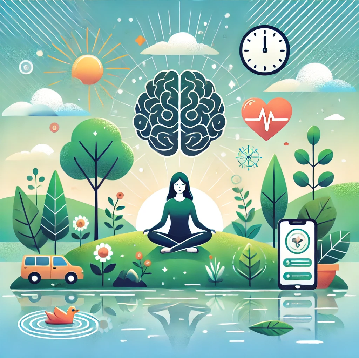Digital Detox: Can It Help Your Anxiety?
A Comprehensive Guide With today’s very connected world, digital devices play a big role. With all the benefits that accompany them, too much time spent in front of the screen can be damaging for mental health, creating stress, anxiety, sleep disorder, and less concentration. A digital detox—a planned break from digital devices—can give your mind and body a needed reset.
In this article, we’ll explore the impact of digital detox on mental health, its benefits, and practical tips to incorporate it into your routine.

What is a Digital Detox?
A digital detox involves intentionally reducing or eliminating the use of digital devices, such as smartphones, computers, and social media, for a specific period. It aims to help individuals reclaim balance, improve focus, and foster a healthier relationship with technology.
Key Objectives of a Digital Detox:
•Reduce device usage.
•Reduce digital distractions.
•Feel better mentally and emotionally.
Before considering the benefits of a digital detox, it is first important to understand how excessive screen time negatively affects mental health:
1. Increased Stress and Anxiety
Notifications that never end, work emails, and social media comparison keep us always on edge, thus increasing stress levels.
Stat Insight:
A study by the American Psychological Association found that 43% of Americans say checking emails, texts, or social media is a major source of stress.
2. Sleep Disruptions
The blue light emitted from screens decreases melatonin production, disrupting the normal sleep-wake cycle in the body.
Impact:
Poor quality of sleep can result in sleepiness, crankiness, and reduced cognitive ability.
3. Shorter Concentration Span
Using devices often conditions the brain to learn fast. This makes it difficult to keep focus on tasks for a long time. 4. Negative Self-Image
Social media usually presents unrealistic ideas of beauty and lifestyles, which may make people feel inadequate and reduce their self-esteem.
Impact of Digital Detox on Mental Health
Taking time away from digital devices can greatly improve mental health. Here’s how: 1. Reduces Stress and Promotes Relaxation
A digital detox lets you cut off from the constant flow of notifications, emails, and news updates and gives your mind a chance to rest.
Effects:
•Reduces cortisol levels (the stress hormone).
•Increases mindfulness and presence.
2. Better Sleep Quality
Reducing screen time before bedtime helps regulate melatonin production, leading to better sleep.
Benefits of Good Sleep:
•Better mood and energy.
•Improved memory and cognitive performance.
Quick Tip:
Set a “no-screen” time at least an hour before bedtime to reap maximum sleep benefits.
3. Improves Concentration and Productivity
The brain is able to concentrate better on tasks without digital distractions, thereby increasing productivity and creativity.
Illustration:
Engaging in deep work or creative hobbies during a digital detox brings a sense of accomplishment.
4. Improves Emotional Well-being
Stepping away from social media reduces the pressure of comparison and fosters a healthier self-image.
Impact on Emotional Health:
• More self-acceptance and self-esteem.
• Less loneliness and FOMO (fear of missing out).
5. Forms Ties
A digital detox connects you more meaningfully to your family and friends because it encourages face-to-face communications.
Outcome:
Improved communication and emotional bonds.
How to Start a Digital Detox: Step-by-Step Easy Steps to Begin a Digital Detox It can be easy to start a digital detox.
1. Clearly Define Goals
Define what you would like to achieve with detox: less stress, better sleep, improved concentration.
Example Goals:
• Less time spent on social media
• No emails at work after 7 PM
• More off-screen activities
2. Begin Small
Start with detox time as small as an hour in a day or a device-free evening, and gradually increase it.
Try a “tech-free” day once a week for a reset and recharge
3. Create Device-Free Zones Apps to Monitor Usage
Ironically, technology can help manage your detox. Apps like Screen Time (iOS) or Digital Wellbeing (Android) track and limit screen time.
Action Step:
Set daily time limits for social media or gaming apps to reduce usage.
4. Find Alternative Activities
Replace screen time with activities that engage your mind and body, such as:
• Reading a book.
• Practicing yoga or meditation.
• Journaling.
• Spending time outdoors.
Bonus: 1. FOMO (Fear of Missing Out)
It’s natural to feel like you’re missing important updates or events during a detox.
Solution:
Remember that what’s important will still be there when you reconnect. Be present.
2. Work Responsibilities
For those who have work-related digital responsibilities, a detox may seem impractical.
Solution:
Establish boundaries, such as disabling notifications outside of work hours or setting times to check email.
3. Boredom
You may find yourself bored without digital entertainment.
Solution:
Try new hobbies, exercise, or spend quality time with family.
FAQs About Digital Detox
Q1. How long should a digital detox last? Start with short times, like a few hours, and then try full days or weekends. How long you do it depends on your goals and way of life.
The Long-Term Benefits of Digital Detox
Regular digital detoxes lead to long-term improvements in mental health and well-being: • More meaningful connections with other people.
For related: Meditation Improve on clarity and concentration, Easy Natural Ways to Deal with Stress, How to Switch to a Lifestyle of Organic Living






This Post Has One Comment